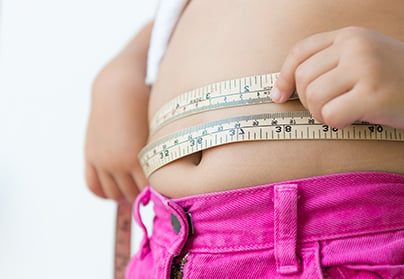Childhood obesity is defined as a child or adolescent weighing much more than the normal healthy weight for his or her age and height.

More and more children are being identified as overweight or obese in the world, but primarily in those countries that are eating a Westernized diet style. It is estimated that approximately one out of four children in the U.S. are overweight, and one out of six children are considered obese.1 Calculating BMI for a child is not the same as for an adult, as the normal range changes with age for a child. Although BMI isn’t as accurate as checking body fat percentage, it can be acceptable for estimation purposes. Using a BMI-for-age growth chart, after measuring height and weight, can determine if a child is close to the overweight range. If the BMI falls above the 85th percentile, they are considered overweight, and if they are above the 95th percentile, they are considered obese.
But much more important than calculating whether or not a child is obese or not is looking at what the child is eating and physically doing from day to day, which will significantly determine their weight and be the determinant of their future health. With high-calorie, addictive foods being marketed to children and parents alike, it is not difficult to understand why childhood obesity has become an epidemic over the recent decades. As with adult obesity, other contributing factors to gaining excessive weight include:
ONLINE: All members of DrFuhrman.com can search the Ask the Doctor archives for discussions on this topic. Platinum and Diamond members can connect with Dr. Fuhrman by posting questions in the forum. Not a member? Join now.
IN PERSON: Book a stay at Dr. Fuhrman’s Eat to Live Retreat in San Diego, California. With options ranging from one, two and three months (and sometimes longer) you will be under Dr. Fuhrman’s direct medical supervision as you hit the “reset” button on your health. For more information: (949) 432-6295 or [email protected].
EVENTS: Join Dr. Fuhrman for an online boot camp, detox or other event. During these immersive online events, you’ll attend zoom lectures, follow a special meal plan, and have access to a special, live Q&A session with Dr. Fuhrman. Learn more about events.
The following are sample questions from the Ask the Doctor Community Platinum and higher members can post their health questions directly to Dr. Fuhrman. (All members can browse questions and answers.)
I am determined to abandon my SAD diet for a Nutritarian one and set a healthy example for my family. I will be introducing solids to my six-month-old and want to start him out healthy from day one. Any suggestions?
You are the parent, and you are responsible for your child’s health! You are in full control of the meals that are provided and the examples that you set. The bottom line is that you can have a major impact on his future health and protect him from developing serious childhood illnesses, autoimmune diseases, emotional and learning disorders, and even later life cancer, all by the food choices in your home. Your goal should be to instill healthy habits in your child so that he grows up at a healthy weight, enjoys healthful foods and exercise, and holds on to these habits as an adult. All of the science and the basic how-tos are addressed in my book, Disease Proof Your Child.
I bought some chocolate rice milk. I was thinking of giving some to my nine month old, but I read the info on the packaging, and it says to only give to children under five with the consent of your doctor. What is it about this product that makes it not suitable for children under five? Is it ok to give it to them?
It is junk food. I guess most mothers give their kids soda, apple juice, and all types of sweet liquids that are not healthful. Liquid sweets are obesity and diabetes promoting, and when given to children, starts them on the road to dangerous eating habits and bad health. So I have no idea why you would want to feed an infant or toddler junk food. The only liquids safe for a nine month old are breast milk and water; anything else is detrimental to their health and promotes childhood obesity.